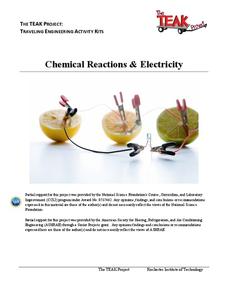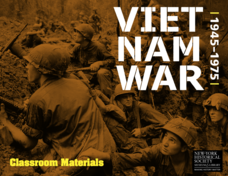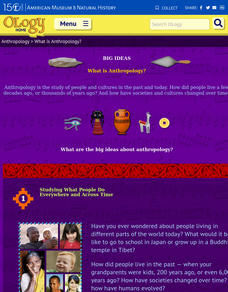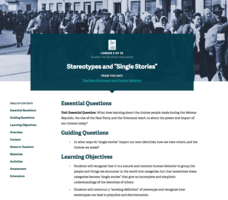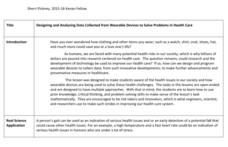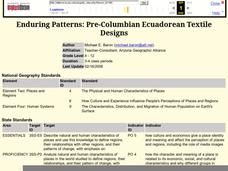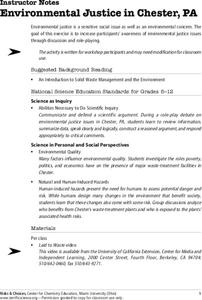Curated OER
Artificial Selection
The second lesson in the series begins with a starter activity discussing wild versus domesticated animals. Then, scholars play a card game, with optional variations, to emphasize artificial selection. Next, they attend a field trip to a...
Rochester Institute of Technology
Chemical Reactions and Electricity
After a discussion of chemical reactions and electricity, scholars break into groups and follow a scripted activity to discover if fruit can power a clock. After a concluding discussion, the class a presented with a challenge.
New York Historical Society
The Vietnam War: 1945-1975
Do pupils know that the Vietnam War spanned a period of 30 years? A war that long is bound to leave devastating effects. Help young historians develop a comprehensive understanding of the war through multiple units on the subject that...
Curated OER
19c European Liberalism
If you'd like to prompt some great discussions in your history class, this presentation will surely get your class talking. Addressing 19th century liberalism in Europe (including influences from England, France, America, and Ireland),...
American Museum of Natural History
What is Anthropology
A colorful resource introduces learners to the four major fields of anthropology: cultural anthropology, linguistic anthropology, biological anthropology, and archaeology. Explanations are provided for what each field studies, the kinds...
Curated OER
Greeks Around the World: A Case Study on Greek Diaspora
Students gain an understanding of the concept of Diaspora relating to Greeks. They use guided discovery to apply the geographic inquiry model to an examination of the reasons for Greek Diaspora.
Curated OER
World War II - War Comes to Hawaii
Ninth graders use geographic representations to organize, analyze, and present information on people, places, and environments. They use tools and methods of geographers to construct, interpret, and evaluate qualitative and quantitative...
Curated OER
German Energy Conversations
High schoolers identify and interpret the current German energy mix and trends, as well as to make comparisons and contrasts to that of their own country. They write a two paragraph description of including its likely position in the...
Facing History and Ourselves
Stereotypes and “Single Stories”
Help bring subconscious stereotypes to the surface to stop it in its tracks. Pupils first read an excerpt describing the experience of prejudice and analyze how this process connects to World War II. Then, they write a creative story...
Curated OER
Bioethics and Effective Health Care
High Schoolers participate in a class discussion on the ethical issues faced in the health care industry today. In groups, they develop their own definition of bioethics and role play the role of one of the various types of members of...
Curated OER
Geo-Magazine
Divide your geography class into groups and have each research an assigned region. The result of this project is a regional magazine that addresses the five themes of geography. Many valuable resource links are embedded into the page...
Curated OER
Living in the Desert
Conduct an investigation on the plants used by the Hohokam tribe. To survive in the harsh desert environment the Hohokam used many natural resources. Learners read, research, map, and graph multiple aspects of Hohokam plant use as a...
Curated OER
William Apess and the Mashpee "Revolt" of 1833
Prompt your class with the following question: What was the status of American Indians in Massachusetts during Jackson's presidency? To answer this question, class members will read a series of primary source documents (attached),...
Japan Society
Nature and the Environment in Postwar Japan
Japan has a complex relationship with the environment. Explore this relationship with your class through this resource. Included are thought questions, several activity ideas that range from writing, to discussion, to research, and an...
Asian Art Museum
Defining "Home"
Open-ended dialogue and guiding questions lead children through a discussion about the relationship between physical objects and personal identity. They analyze the work of two contemporary Japanese artists who have use their mediums to...
Kenan Fellows
Designing and Analyzing Data Collected from Wearable Devices to Solve Problems in Health Care
Wearable devices have become more the norm than the exception. Learners analyze data from a sample device with a regression analysis in a helpful hands-on lesson. Their focus is to determine if there is a connection between temperature...
Curated OER
Home in the Desert: Lesson for Use with This House is Made of Mud
Third graders examine how a family modifies their environment to create a home out of mud. They read the book "This House is Made of Mud" by Ken Buchanan, and write a description of their own home that compares the home of mud to their...
Chicago Botanic Garden
Calculating Your Ecological Footprint
You can lower your ecological footprint by recycling! Lesson four in this series of five has individuals, through the use of a computer, calculate their ecological footprints. Through discussions and analysis they determine how many...
Curated OER
Swamps, Shrimp, and Tsunamis: A Simulation of Sustainable Development Issues in Coastal Ecuador
Students examine the economic benefits, environmental losses and dangers of the shrimp farming industry on the coast of Ecuador. They read a script, role-play people involved in the shrimp business, and write an essay of the pros and cons.
Curated OER
Enduring Patterns: Pre-Columbian Ecuadorean Textile Designs
Learners examine Pre-Columbian Ecuadorean design motifs. They view examples of the designs, discuss the motif themes, and replicate the designs on modern fabric using authentic methods.
Curated OER
Environmental Justice in Chester, PA
Over several days, learners communicate and defend an argument regarding environmental justice issues in Chester, PA. After discussing the issue and viewing a video about the location of several toxic waste facilities in Chester, they...
Curated OER
Dos mapas de Florida, el Caribe y parte de Sur America
What can maps tell us about the past? Find out with a Spanish lesson that incorporates geography. After examining maps individually, comparing two old maps of Spanish Florida and writing notes in the provided Venn diagram, pupils pair up...
Curated OER
How Toxic Is It?
Students participate in an activity in which they investigate the scientific method and seed germination as well as practice graphing and metric measuring skills. Students examine toxicity by exposing Wisconsin Fast Plants seeds to toxic...
Curated OER
Population Biology - Biology Teaching Thesis
Students explore the effects of different density-dependent and density-independent factors on population growth. They explore how the interactions of organisms can affect population growth. Students explore the pattern of population...



